- Home
- Jan-Philipp Sendker
The Art of Hearing Heartbeats Page 2
The Art of Hearing Heartbeats Read online
Page 2
Or was he the victim of an accident on the Gulf of Siam? Was he hoping to enjoy two weeks of peace and quiet, for a change? Maybe he went to the coast and drowned there while swimming. That’s our family’s version, the official one at least.
The homicide squad suspected him of leading a double life. They refused to accept my mother’s assertion that she knew nothing about his first twenty years. They considered the very notion so preposterous that at first they suspected her of having played some part in his disappearance, either as his accomplice or as the perpetrator. Only when it became clear that there were no high-stakes life-insurance policies involved, that no one would profit financially from his purported death, did they shake off every shadow of suspicion. There very well could have been some side of my father lurking behind the mystery of those first, long-lost twenty years, a side that we, his family, had never seen.
Chapter 3
MY LAST MEMORY of him is already four years old. It was the morning after I’d graduated from law school. We had celebrated my graduation the previous evening, and I did not feel like going home that night. For some reason, I wanted to start the day within the safety of my childhood rituals. To feel that sense of security. Just once more.
Perhaps I’d had a premonition.
My father woke me early, standing at the foot of my bed wearing his old-fashioned gray overcoat and a brown Borsalino. As a little girl I used to watch him going off to work dressed like that. Every morning I would stand at the window waving good-bye, crying sometimes because I didn’t want him to leave. Even years later, when his chauffeur would wait for him and he had only to take three steps across the sidewalk to get into the limo, he always wore the coat and the hat. In all that time he never varied his wardrobe; he just bought new coats and hats at regular intervals, the hats exclusively Borsalinos. He owned six of them: two black, two brown, and two navy. When he could no longer find the overcoats, even at the most conservative haberdashers in New York, he started having them tailor-made.
The Borsalino was his talisman. He had bought that Italian hat to wear to his first job interview. He got the job. Back then the hat had been clear evidence of his good style and taste. Over the years, though, it had come to seem old-fashioned, then eccentric, until finally he looked like an extra from a fifties film. As a teenager I had been embarrassed by my father’s choice of clothes. He looked so completely out of step, and he would greet my friends’ mothers with a bow. The other kids giggled when he picked me up at school. He never wore sneakers, jeans, or sweatshirts. He despised the casual American style of dress, which he said pandered to the lower human instincts, one of which was craving comfort.
My father stood by my bed and whispered my name. He said he had an appointment in Boston and didn’t know exactly when he would be back. Probably not for a couple of days, which was odd because his appointment calendar ran as reliably as his wristwatch. Besides, he flew to Boston all the time and never stayed overnight. But somehow I had been too tired to take notice. He kissed me on the forehead and said, “I love you, little one. Never forget that, you hear?”
I nodded groggily. “I love you, too.”
I rolled over, pressed my face into the pillow, and went back to sleep. I haven’t seen him since.
The first indication that something wasn’t right came just after ten that morning. I had slept in and was coming into the kitchen. My mother was waiting to have breakfast with me. She was sitting in the solarium with a cup of coffee, leafing through Vogue. We were both still in our bathrobes. There were warm cinnamon rolls on the table along with fresh bagels. I was sitting at my old place, my back against the wall, feet on the edge of the chair, arms wrapped tightly around my knees, sipping orange juice and telling my mother about my summer plans when the phone rang. Susan, my father’s secretary, wanted to know if he was sick. His ten o’clock appointment—by no means a trivial one—was wondering where he was. No one had said anything about Boston.
Something must have come up on short notice, both women agreed. He hadn’t managed to call, was stuck at the moment in some meeting, and would surely check in within the next couple of hours.
My mother and I finished breakfast. I felt a bit anxious, but she was so calm that I let it go. After breakfast we went together for a facial, then through Central Park to Bergdorf Goodman. It was one of those warm early-summer days when New York is its freshest. The park smelled of cut grass, people were lying in the sun on the Sheep Meadow, and a couple of young guys, shirts off, were tossing around a Frisbee. Two older men went Rollerblading hand in hand in front of us.
My mother nudged me along. At Bergdorf Goodman she bought me a yellow floral summer dress, and afterward we very predictably went to have tea at the Plaza.
I didn’t care much for that particular hotel. Its faux French-Renaissance style was a bit too fanciful for me, too kitschy, but I had long ago recognized the futility of trying to have tea with my mother anyplace else. She adored the lobby with the gilded plaster on the high ceilings and walls, the columns so elaborate and ornate—as if made of icing. She basked in the waiters’ pretentious bearing, the way the French maître d’ saluted her (“Bonjour, Madame Win”). We sat between two palms by a small buffet of cakes, sweets, and ice cream. Two wandering violinists played Viennese waltzes. My mother ordered caviar blinis and two glasses of champagne.
“Is there something else to celebrate?” I asked.
“Your graduation, my dear.”
We sampled our blinis. They were too salty, the champagne too warm. My mother signaled to the waiter.
“Let it go, Mom,” I protested. “Everything’s fine.”
“Hardly,” she said to me in a mild tone, as if I knew nothing about such things.
She chastised the waiter, who took back our order amid profuse apologies. Her voice could sound so cool and sharp. There was a time I had feared it. Today I found it merely unpleasant.
She looked at me. “You would have eaten them, wouldn’t you?”
I nodded.
“Your father, too. In a lot of ways you’re quite like each other.”
“How do you mean?” I asked. It didn’t sound like a compliment.
“Is it your humility,” she asked, “your passivity, or your fear of conflict? Or is it arrogance?”
“What does arrogance have to do with it?”
“Neither of you is ever willing to deal with waiters,” she said. I couldn’t understand the rage smoldering in her voice. It had no connection to lukewarm champagne and salty blinis. “They’re not worth the trouble. I call that arrogance.”
“It’s just that it’s not that important to me,” I said. That was only half true. I found it embarrassing to complain about anything, whether at a restaurant, a hotel, or a shop. Still, such things mattered more to me than I let on. They would rankle, and after the fact I was often annoyed with myself for having been a pushover. With my father it was different. His silence in such situations was genuine. To him it truly did not matter. He smiled whenever anyone cut in front of him in line. He never counted his change. My mother counted every cent. I envied his composure. My mother couldn’t figure him out. She was strict with herself and others alike—my father only with himself.
“How can it not matter to you whether or not you get what you’ve paid for? I can’t fathom it.”
“Can’t we just let it go?” I asked, more pleading than demanding. “Aren’t you worried about Dad?”
“No. Should I be?”
Looking back, I wonder if my mother’s equanimity wasn’t an act. Neither of us said a single word about the broken appointment. She never checked back with his office to see if he’d called in. Why was she so sure that nothing untoward had befallen him? Did she just not care? Or had she been suspecting for years that it would eventually come to this? Her apparent lightheartedness that day smacked of the relief—even happiness—a person might feel when a long-foreseen and inevitable catastrophe has finally come to pass.
Influential Wa
ll Street Lawyer Disappears Without Trace,” the New York Times reported a few days after my father’s disappearance. For the next several days the papers were full of speculation. Was it murder, a client out for vengeance? A dramatic kidnapping? Was there some Hollywood connection? Everything the police uncovered in the first two weeks only made the case more mysterious. Early in the morning on the day of his disappearance, my father had indeed driven to JFK, but instead of flying to Boston he had gone to Los Angeles. He had bought the ticket at the airport, and he didn’t check any bags. From Los Angeles he flew first class to Hong Kong on United Airlines Flight 888. One flight attendant remembered him because he didn’t drink any champagne, and instead of a newspaper he read a volume of Pablo Neruda’s poetry. The flight attendant described my father as very calm and exceptionally polite. He didn’t eat much and barely slept, didn’t watch any movies, and spent most of his time reading.
My father apparently then spent one night in Hong Kong at the Peninsula hotel, room 218, ordered curry chicken and mineral water from room service, and, according to the staff, never left his room. The next day he boarded Cathay Pacific Flight 615 to Bangkok, where he spent a night at the Mandarin Oriental. He made no attempt to cover his tracks. He stayed in the same hotels he always used on business trips and paid all his bills by credit card, as if he knew that this would be his journey’s end, at least for the investigators. Four weeks later a construction worker found his passport in the vicinity of the Bangkok airport.
A number of circumstances suggested he had never left Thailand. The police went over all the passenger lists for flights out of Bangkok. His name failed to show up anywhere. On occasion the detectives speculated that he had acquired a false passport in Thailand, then flown elsewhere under an assumed name. Several Thai Airways flight attendants claimed to have seen him: one on a flight to London, another en route to Paris, and still a third on a plane to Phnom Penh. Not one of these leads panned out.
According to the immigration authorities, my father came from Burma to the United States on a student visa in 1942. He studied law in New York and became an American citizen in 1959. He listed Rangoon, the capital of the former British colony, as his place of birth. Inquiries by the FBI and by the American embassy in Rangoon led nowhere. Win is a common surname in Burma, and no one seemed to have any knowledge of my father’s family.
Chapter 4
AND SO THERE must be in life something like a catastrophic turning point, when the world as we know it ceases to exist. A moment that transforms us into a different person from one heartbeat to the next. The moment when a lover confesses that there’s someone else and that he’s leaving. Or the day we bury a father or mother or best friend. Or the moment when the doctor informs us of a malignant brain tumor.
Or are such moments merely the dramatic conclusions of lengthier processes, conclusions we could have foreseen if we had only read the portents rather than disregarding them?
And if these turning points are real, are we aware of them as they happen, or do we recognize the discontinuity only much later, in hindsight?
These are questions that had never interested me before and to which I had no answers. My father’s disappearance, at any rate, was nothing of the kind. I loved my father, I missed him, but my life over the past four years wouldn’t have played out any differently, it wouldn’t have altered a single important decision, if he had still been with us. At least that’s what I used to think.
About a week ago, just after eight, when I came home from the office, the doorman called me back out of the elevator. It was pouring outside. My shoes were wet. I was freezing and couldn’t wait to get to my apartment.
“What is it?” I asked impatiently.
“Package,” he said.
I glanced out the huge glass windows of the lobby into the street. The taillights of the cars glistened on the wet asphalt. I was dying for a hot shower and a cup of tea. The doorman handed me a bag containing a brown package about the size of a shoebox. I tucked it under my arm and rode up to my studio on the thirty-fifth floor. My father had bought it for me before I graduated from law school.
I checked my answering machine: two messages. On the table was a stack of bills and junk mail. There was a lingering smell of cleaning chemicals, so I opened the balcony door. It was still raining, and the clouds hung so low that I could barely make out the opposite bank of the East River. Below me traffic was backing up on Second Avenue and the Queensboro Bridge.
After my shower I took the package out of its bag. I instantly recognized my mother’s handwriting. Occasionally she sent me greeting cards or newspaper clippings that she thought I would be—or at least ought to be—interested in. She despised answering machines, and that was her way of leaving a message. It had been a long time, though, since she’d sent me a package. Inside I found a stack of old photos, documents, and papers belonging to my father, along with a few lines from her:
Julia
I discovered this box while straightening out the attic. It had fallen behind the old Chinese dresser. Maybe you’re interested in these things. I’ve included the last picture of the four us. I don’t need any of it anymore. Call me.
Yours,
Judith
I spread the little stack out on the table. On the very top was the family portrait taken the day I graduated. I’m standing arm-in-arm between my parents, beaming. My brother is standing behind me, his hands on my shoulders. My mother is smiling proudly into the camera. My father is grinning, too. The perfect happy family. How photographs can lie. There was nothing to indicate that this would be the last picture of all of us together or, worse still, that one of us had long been plotting to disappear. My mother had also included two expired passports, my father’s American naturalization certificate, and a couple of old appointment calendars, chock-full of tiny notations. Boston. Washington. Los Angeles. Miami. London. Hong Kong. Paris. There were years when my father circled the globe multiple times. He had worked his way up to partner, one of eight in his firm, and as a lawyer he had specialized early in the entertainment industry. He advised Hollywood studios on film contracts, takeovers, and mergers. He also counted some of the biggest stars among his clients.
I never really understood why he was such a professional success. He worked a lot but never exuded an air of personal ambition. He was not vain, and he never tried to capitalize on the fame of his clients. His name never turned up in the gossip columns. He never attended parties, not even the opulent charity balls that my mother and her friends organized. The need to fit in somewhere, so typical of immigrants, seemed utterly alien to him. He was a loner and the antithesis of most people’s image of the celebrity lawyer. Maybe that was the very quality that inspired trust and made him such a coveted negotiator: his calm and composure, his lack of pretense, his absent, always somewhat innocent manner. But he had other ways, too, which sometimes made his business associates and his few friends uneasy. For example, his memory was too good, and he was an uncanny judge of character. A cursory glance sufficed for him to memorize almost anything; he cited memos and letters from years back, verbatim. At the beginning of a conversation he would close his eyes and concentrate on a person’s voice as if losing himself in a song, whereupon he seemed to know exactly what frame of mind people were in, how confident they were, whether they were telling the truth or bluffing. Supposedly it was something one could learn, but who had taught him, when, and where, he wouldn’t reveal, no matter how I pleaded. Not once in my life had I managed to deceive him.
The oldest calendar enclosed was from 1960. I flipped through it—nothing but business appointments, unfamiliar names, places, and times. In the middle of it all was a note in my father’s hand:
How much does a man live, after all?
Does he live a thousand days, or only one?
For a week, or for several centuries?
How long does a man spend dying?
What does it mean to say “for ever”?
—Pablo Neruda
<
br /> Then, at the very back, a thin blue airmail envelope, folded neatly into a small rectangle. I took it out and unfolded it. It was addressed to:
Mi Mi
38 Circular Road
Kalaw, Shan State
Burma
I hesitated. Did this unassuming blue onionskin hold the key to my father? I took the letter and walked over to the stove. I could burn it. The flames would transform the thin paper to ashes in a matter of seconds. I turned on the burner, heard the gas hissing, the automatic ignition clicking, the flame. I held the envelope close to the fire. One move and the family would have its peace. I can’t remember how long I stood in front of the stove; I only know that I suddenly started to cry. Tears streamed down my cheeks. I didn’t know why I was crying, but the tears just kept coming, harder and faster, until at some point I found myself back on my bed, bawling and sobbing like a little girl.
The clock on my nightstand read 5:20 when I woke. I could still feel the grief in my bones. For the space of a few breaths I couldn’t remember the reason and hoped that it had all been a dream. At the table I unfolded the letter very gently, as if it might pop like a soap bubble in my hands.
April 24, 1955
New York
My beloved Mi Mi,
Five thousand eight hundred and sixty-four days have passed since last I heard the beating of your heart. Do you realize how many hours that is? How many minutes? Do you know how impoverished a bird is that cannot sing, a flower that cannot blossom? How wretched a fish out of water?
It is difficult to write to you, Mi Mi. I have written you so many letters that I have never sent. What could I tell you that you don’t already know? As if we needed ink and paper, letters and words, in order to communicate. You have been with me through each of the 140,736 hours—yes, it has already been that many—and you will be with me until we meet again. (Forgive me for stating the obvious just this one time.) When the time comes, I will return. How flat and empty the most beautiful words can sound. How dull and dreary life must be for those who need words, who need to touch, see, or hear one another in order to be close. Who need to prove their love, or even just to confirm it in order to be sure of it. I sense that these lines, too, will never find their way to you. You have long since understood anything I might write, and so these letters are in truth directed to myself, meager attempts to still my desire.

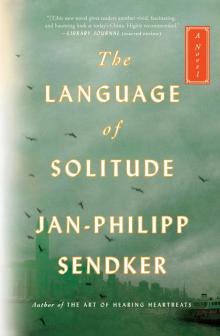 The Language of Solitude
The Language of Solitude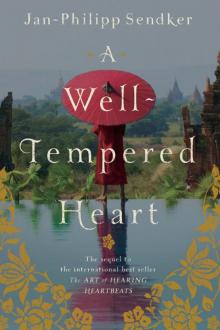 A Well-Tempered Heart
A Well-Tempered Heart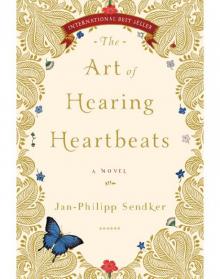 The Art of Hearing Heartbeats
The Art of Hearing Heartbeats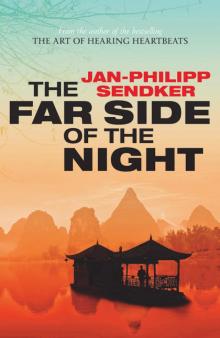 The Far Side of the Night
The Far Side of the Night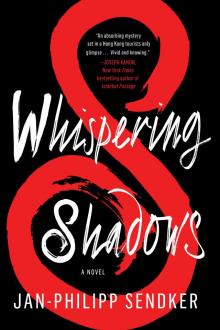 Whispering Shadows
Whispering Shadows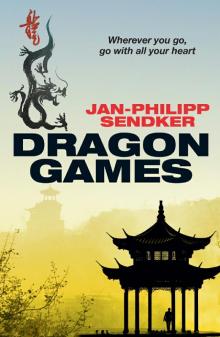 Dragon Games
Dragon Games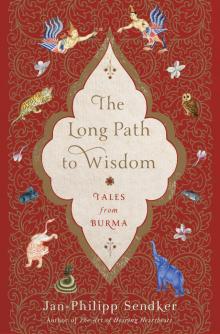 The Long Path to Wisdom
The Long Path to Wisdom